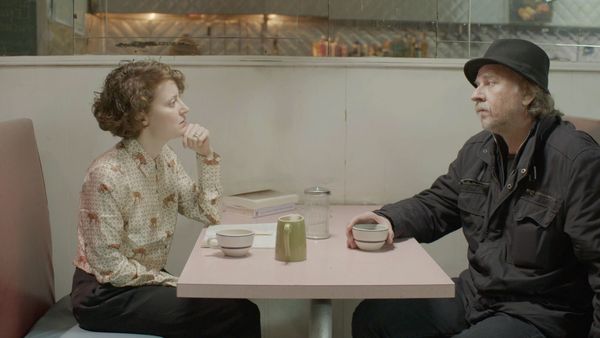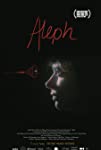Eye For Film >> Movies >> Aleph (2021) Film Review
Aleph
Reviewed by: Anne-Katrin Titze

Films and references to cultural traditions may flicker past your inner eye in Iva Radivojevic’s Aleph, a luminous take on Jorge Luis Borges, narrated by Anne Waldman, which is a highlight of the 50th anniversary edition of New Directors/New Films. The Thai ghost may be Uncle Boonmee’s brother from Apichatpong Weerasethakul’s picture. An ad for Jim Jarmusch’s Paterson graces the back pages of a newspaper in Buenos Aires and Oscar Wilde’s Happy Prince is not the only one who is able to see without eyes.
The woman who disappears into the painting in Aleph feels strangely related to the old couple who befriend and haunt Naomi Watts in David Lynch’s Mulholland Drive, only to appear downsized out of a paper bag later on.

During my conversation with the filmmaker, I learned that Roland Barthes is responsible for the like/dislike structure in Algeria and that the eyes in Mexico are her take on a surrealist world of hands. A “walk to the gardens of eternity” is a stroll of a special kind. Aleph shows how big our world is, how manifold, how beautiful, and how the really important riddles are the same for everybody. The journey to the centre of the universe can never be a shortcut; and if it excludes the other, the labyrinth and the fog will surely devour the traveller.
With Borges as the first of many guides, we travel around the globe to find the mysterious portal, the letter aleph that contains the whole universe. In this delicately told and forcefully edited film, what we see is often not what we hear. The truth lies elsewhere. There is Clara in Buenos Aires, who “can’t feel anything these days.” Later, another girl across the globe will say “I feel too much,” and they seem to be expressing the same dilemma.
How come the woman in the white Louis XIV wig who stares in a museum at a painting from 1943 is swallowed up by it? As “a place is only a memory,” a new guide takes us through labyrinthine streets in Algeria. Do we walk to the gardens of eternity now, as “our memories can only take us so far to absorb the vibrations of the future?” How did we get on the tram from Roosevelt Island and what can we learn about happiness and non-erasable guilt?
Masa Dakic and Žarko Lauševic sit in a diner and discuss what it would mean to be informed that a moment in your life is going to be the happiest while it happens. They speculate about the consequences when “you realize you’re a murderer forever,” and as though this is all too unspeakable, we continue to hear their voices, although their lips don’t move. This is merely one of the many carefully constructed moments in Aleph, where cinematic possibilities underline the transmission of significant ideas and emotions.
In a monastery nuns watch a billowing curtain. In the Himalayas monkeys come and go. Her face framed by her own arms, a woman in Kathmandu takes up the body language and emotional strands we encountered earlier in Argentina. “In her hair resides the concentration of the universe,” she says and we learn that the population of Bengal tigers has tripled.
Off we race in a snowmobile to a radar station in Greenland, while crows carry messages to eternity. As “time passes differently in each place,” we meet a ghost on a train to Bangkok, who becomes our next guide on a boat ride with the mist rising blue from the waters.
Twins or doubles (Desire Marea) in matching zebra suits invite us to tea and all the eyes of Mexico stare back until we finally reach the vortex. The spiral takes us in, where a giraffe, a zebra, an antelope await, together with flamingoes, fishes, an elephant, and - lo and behold - the woman who disappeared into the painting so many moons ago.
Reviewed on: 30 Apr 2021














